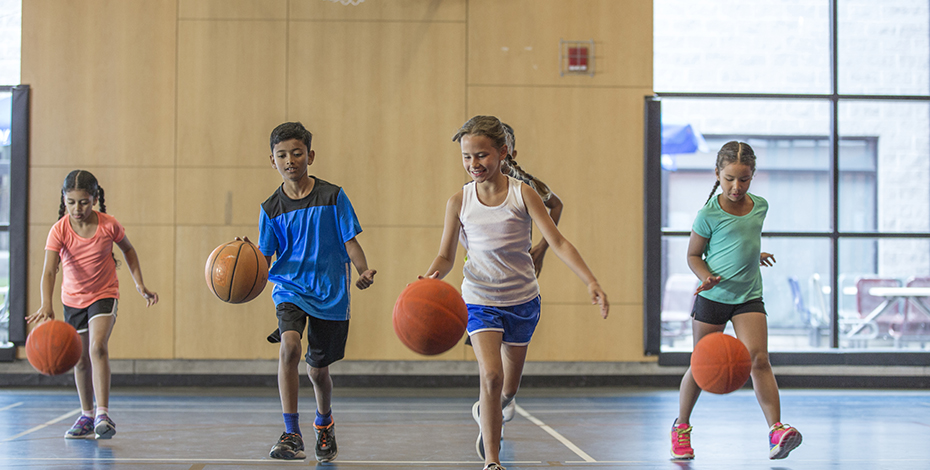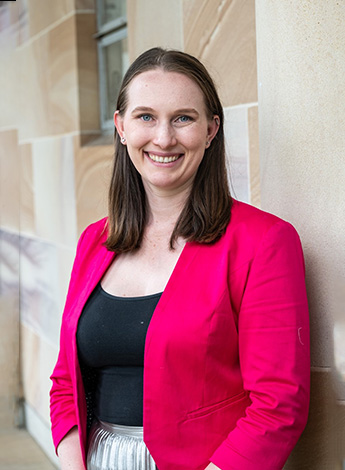
Giving kids the opportunity to play sports

Georgina Clutterbuck APAM received a Physiotherapy Research Foundation Seeding Grant in 2022 to help children with juvenile idiopathic arthritis participate in community sport.
Sports Stars is a program designed by Queensland-based paediatric physiotherapist Dr Georgina Clutterbuck to help children with various disabilities make the transition from physiotherapy in the clinic to playing community sport.
The eight-week physiotherapist-led group program introduces children to four different sports, teaching them the basic locomotor skills, training drills, game play and rules relating to each sport and building their confidence before they move into a community sport program.
‘We get the kids practising the different types of interactions that happen in a sports group, but in a really low pressure environment where kids feel confident about exploring what their differences are and can ask questions and ask for help,’ Georgina says.
Georgina originally developed the program for a group of her clients when she was working clinically at the Family and Early Childhood Services team of Disability Services.
She evaluated it for children with cerebral palsy as part of her PhD research and has tested it in a range of contexts.
In this project, funded by a Physiotherapy Research Foundation Seeding Grant with support from corporate partner ASICS, she is conducting a feasibility study to see if the program is suitable for children with juvenile idiopathic arthritis (JIA), a painful autoimmune inflammatory disease of the joints.
While studies have shown that exercise can be therapeutic for children with JIA, only about a quarter of children meet the Australian standard of one hour of physical activity daily.
‘We know that participation in enjoyable sport and physical recreation has so many benefits.
‘It’s the main way that people get additional physical activity into their day and we know that it helps with not only physical health but mental health, overall wellbeing and quality of life across the life span,’ Georgina says.
‘Childhood and adolescence is such an important time to be doing physical activity because it sets up our habits for adulthood.
‘There’s a significant drop-off in participation during adolescence, so if there’s already a much smaller population of kids engaging with physical activity in the first place, we’re looking at really low participation rates in adulthood.’
This JIA study differs from previous studies investigating the benefits of the Sports Stars program for children with cerebral palsy and autism in one important aspect—in addition to looking at physical measures such as gross motor skills and balance, the program will also target the pain and fatigue associated with JIA, and measure its impact on these.
The researchers will also look at specific barriers to participation found in children with JIA, who cite pain and fear of pain and injury as reasons they avoid physical activity.

Dr Georgina Clutterbuck is a researcher and lecturer in the University of Queensland's School of Health and Rehabilitation Sciences.
‘Because pain is such a significant contributor, we’re working with our psychology team to develop three psychoeducation sessions for children and families about the safety of participating in physical activity and to address fears that they might have about participation,’ Georgina says.
The feasibility study will be conducted with the assistance of Queensland Children’s Hospital’s rheumatology department and it aims to determine whether the Sports Stars program is acceptable and of interest to children with JIA and their families.
The study will also look at the practicality of the program and whether the assessment measures chosen to evaluate the program are suitable.
‘We will be surveying the parents, the children and the treating therapists about the program, but also collecting the data that we would use in a larger effectiveness trial to see if we’re able to collect it in that time period and how reasonable it is for those kids to be doing that amount of assessment within the time frame,’ Georgina says.
With ethics approval completed, Georgina is planning to get the first of two eight-week study programs started in the middle of the year and expects to report on results in early 2024.
If the results from this study are positive, she hopes to obtain funding to run a larger trial to evaluate the effectiveness of the program in children with JIA.
Previous studies have demonstrated the effectiveness of Sports Stars for children with cerebral palsy in improving both physical function and sports-specific skills and a recent follow-up study showed that the children have retained their improvement in sports participation at two to three years.
‘The benefit of Sports Stars is that it creates a bridge between individual physiotherapy and participation in the community.
‘It gives therapists a structure with which to help children move into community sport and it gives children a really enjoyable way to participate in a small group and build their confidence until they’re ready to make that transition themselves,’ Georgina says.
‘Once they attend and start to connect with their peers and get that social interaction, the physical differences become less important—they’re able to participate and sports coaches are more happy to adapt the activities.
‘It’s really that first step that’s the biggest challenge.’
Ultimately, Georgina would like every Australian child to have the opportunity to participate in enjoyable sport and physical recreation across their lifetime.
‘I know sport isn’t a passion for everyone but I think everyone should have the opportunity to try it and find ways that they like to be active,’ Georgina says.
>> The PRF is pleased to announce that three travel bursaries are available to support PRF Grant Recipients to present their PRF-funded research project at the APA national conference IGNITE 2023 in October. Click here for full details.
© Copyright 2025 by Australian Physiotherapy Association. All rights reserved.





